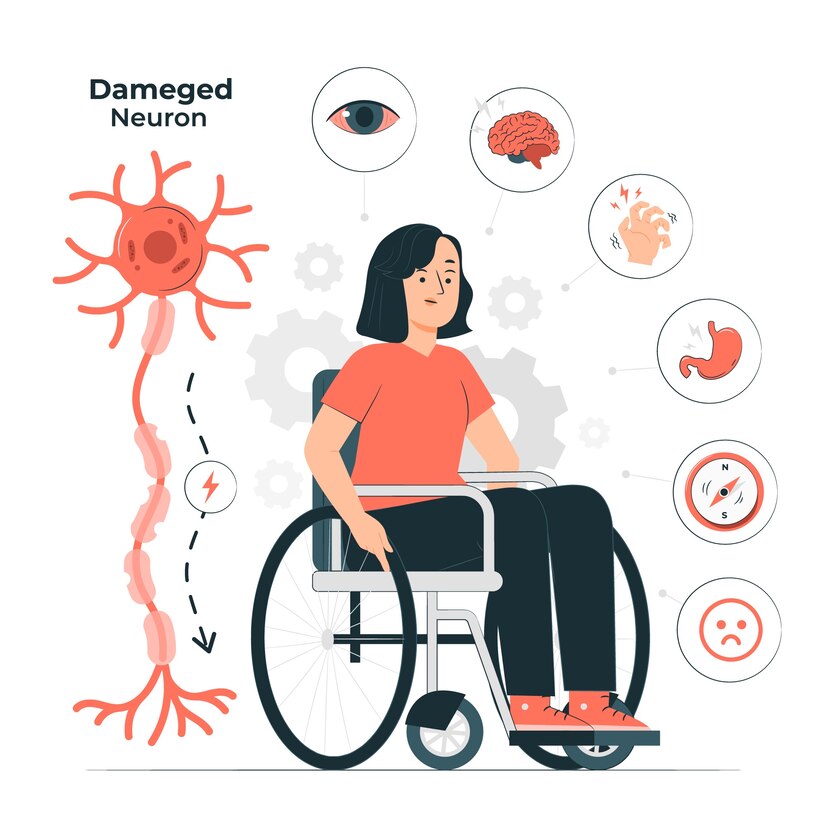Exploring the Potential: Research on CBD for Multiple Sclerosis (MS)
Multiple Sclerosis (MS) is a chronic autoimmune disease that affects the central nervous system, disrupting communication between the brain and the body. Individuals living with MS often experience a wide range of symptoms, including fatigue, pain, muscle spasticity, and mobility issues, significantly impacting their quality of life. As research into alternative and complementary therapies expands, CBD for Multiple Sclerosis has garnered considerable attention. This comprehensive guide will delve into the current research landscape surrounding the use of CBD for Multiple Sclerosis, exploring its potential benefits and the ongoing scientific investigations in this area.
Understanding Multiple Sclerosis (MS): A Complex Condition
Multiple Sclerosis occurs when the immune system mistakenly attacks the myelin sheath, the protective covering of nerve fibers. This damage disrupts nerve signals, leading to the diverse and often unpredictable symptoms of MS. There is currently no cure for MS, and treatments focus on managing symptoms, slowing disease progression, and improving overall well-being. The search for effective and well-tolerated therapies remains a critical priority for the MS community, leading to interest in exploring the potential of CBD for Multiple Sclerosis.
The Promise of CBD: How Research Explores Its Role in MS

CBD for Multiple Sclerosis is being investigated for its potential to alleviate several common and debilitating symptoms associated with the condition. Research focuses on CBD’s interaction with the body’s endocannabinoid system (ECS), a complex network involved in regulating various physiological processes, including pain, inflammation, immune response, and sleep. Here’s how research is exploring the role of CBD for Multiple Sclerosis:
- Pain Management: Chronic pain is a significant challenge for many individuals with MS. Research is examining CBD’s potential analgesic (pain-relieving) properties and how it might interact with pain pathways in the nervous system to provide relief for MS-related pain.
- Reducing Inflammation: Inflammation plays a key role in the progression of MS. Studies are investigating CBD’s potential anti-inflammatory effects and its ability to modulate the immune response in individuals with MS.
- Alleviating Muscle Spasticity: Muscle spasticity, characterized by muscle stiffness and involuntary contractions, is a common and often debilitating symptom of MS. Research is exploring how CBD for Multiple Sclerosis might help to relax muscles and reduce spasticity.
- Improving Sleep Quality: Sleep disturbances are prevalent among individuals with MS, often due to pain, spasticity, or anxiety. Research is investigating CBD’s potential to improve sleep quality by addressing these underlying issues.
- Addressing Fatigue: Fatigue is one of the most commonly reported and challenging symptoms of MS. While research in this area is still emerging, some studies are exploring whether CBD for Multiple Sclerosis might help to improve energy levels and reduce fatigue.
Key Areas of Research on CBD for Multiple Sclerosis

Current research on CBD for Multiple Sclerosis is focusing on several key areas:
- Clinical Trials: Randomized, controlled clinical trials are essential for determining the safety and efficacy of CBD for Multiple Sclerosis in managing specific symptoms. Researchers are conducting these trials to gather robust evidence.
- Observational Studies: These studies track the experiences of individuals with MS who are using CBD products to understand real-world outcomes and potential benefits.
- Preclinical Research: Laboratory studies using cell cultures and animal models help researchers understand the underlying mechanisms of how CBD might interact with the body and affect MS-related processes.
What the Current Research Says About CBD for Multiple Sclerosis
The current body of research on CBD for Multiple Sclerosis presents a mixed picture, with some promising findings and areas where more investigation is needed:
- Sativex: Notably, a cannabis-based medicine called Sativex, which contains both CBD and THC, has been approved in several countries (though not yet fully in the US) for the treatment of spasticity in adults with MS. This highlights the potential of cannabinoid-based therapies for this specific symptom.
- Pain and Spasticity: Some studies suggest that CBD may offer modest benefits for managing pain and spasticity in individuals with MS. However, the evidence is not yet conclusive, and more large-scale, well-designed clinical trials are needed.
- Other Symptoms: Research on the effects of CBD for Multiple Sclerosis on other symptoms like fatigue, bladder dysfunction, and cognitive issues is still in its early stages, with limited evidence available.
- Variability in Products: The wide range of CBD products available, with varying concentrations, formulations, and quality, makes it challenging to draw definitive conclusions from existing research.
It’s crucial to understand that while there is growing interest in CBD for Multiple Sclerosis, the scientific evidence is still evolving, and more rigorous research is required to fully understand its potential role in managing this complex condition.
Important Considerations for Individuals Considering CBD for Multiple Sclerosis
If you are considering using CBD for Multiple Sclerosis, it’s essential to keep the following points in mind:
- Consult Your Healthcare Provider: Always discuss your treatment options, including the use of CBD, with your neurologist or MS specialist. They can provide personalized advice based on your specific condition and other medications you may be taking.
- Product Quality Matters: The quality and composition of CBD products can vary significantly. Choose products from reputable manufacturers that provide third-party lab testing to verify CBD content and purity.
- Dosage is Individualized: There is no one-size-fits-all dosage of CBD for Multiple Sclerosis. What works for one person may not work for another. Start with a low dose and gradually increase as needed, while monitoring for any potential side effects.
- Not a Replacement for Conventional Treatment: CBD should not be considered a replacement for your prescribed MS medications. It may be used as a complementary therapy under the guidance of your healthcare provider.
- Potential Side Effects and Interactions: Be aware of potential side effects of CBD, which can include fatigue, diarrhea, and changes in appetite. CBD can also interact with certain medications.
Navigating the Landscape: Types of CBD Products Being Studied for MS
Research on CBD for Multiple Sclerosis has explored various delivery methods, including:
- CBD Oils and Tinctures: These allow for flexible dosing and are often taken sublingually (under the tongue) for faster absorption.
- CBD Capsules and Softgels: Offer a convenient and pre-measured dose of CBD.
- Oral Sprays (like Sativex): Deliver a consistent dose of cannabinoids.
- Topical CBD Products: Creams and balms applied directly to the skin may be explored for localized pain relief.
The most appropriate type of CBD product for managing MS symptoms may vary depending on the individual and the specific symptom being targeted.
The Future of Research: What’s Next for CBD and Multiple Sclerosis?
The future of research on CBD for Multiple Sclerosis is focused on:
- Large-Scale Clinical Trials: Conducting more robust, randomized, controlled trials to provide definitive evidence on the efficacy and safety of CBD for specific MS symptoms.
- Identifying Optimal Dosages and Formulations: Determining the most effective doses and types of CBD products for different MS-related issues.
- Understanding Long-Term Effects: Investigating the long-term safety and efficacy of CBD for Multiple Sclerosis.
- Exploring the Role of Different Cannabinoids and Terpenes: Research may further explore the potential benefits of full-spectrum and broad-spectrum CBD products and the specific roles of other compounds in the hemp plant.
Conclusion: Staying Informed About Research on CBD for Multiple Sclerosis
The research landscape surrounding CBD for Multiple Sclerosis is dynamic and continues to evolve. While current evidence suggests potential benefits for certain symptoms like pain and spasticity, more rigorous scientific investigation is needed to fully understand the role of CBD in managing this complex condition. If you are considering using CBD for Multiple Sclerosis, it is crucial to stay informed about the latest research, consult with your healthcare provider, and choose high-quality products from reputable sources.
Frequently Asked Questions (FAQs) About Research on CBD for Multiple Sclerosis (MS)
1. What does current research say about the effectiveness of CBD for Multiple Sclerosis?
Current research suggests that CBD for Multiple Sclerosis may offer some benefits for managing symptoms like pain and spasticity. However, the evidence is still evolving, and more large-scale clinical trials are needed to draw definitive conclusions. Sativex, a cannabis-based medicine containing both CBD and THC, has shown efficacy for spasticity in some countries.
2. Can CBD for Multiple Sclerosis help with fatigue?
Research on the effects of CBD for Multiple Sclerosis on fatigue is still in its early stages. While some individuals report anecdotal benefits, there is currently limited scientific evidence to support its effectiveness for this specific symptom.
3. Are there any FDA-Approved Treatments containing CBD for Multiple Sclerosis?
Currently, there is no FDA-Approved Treatment containing only CBD for Multiple Sclerosis in the United States. However, Sativex, which contains both CBD and THC, has been approved in several other countries for the treatment of spasticity in adults with MS.
4. What are the potential risks or side effects of using CBD for Multiple Sclerosis?
Potential side effects of using CBD for Multiple Sclerosis can include fatigue, diarrhea, changes in appetite, and interactions with other medications. It’s crucial to discuss the potential risks and benefits with your healthcare provider before using CBD.
5. Where can I find reliable information about research on CBD for Multiple Sclerosis?
You can find reliable information about research on CBD for Multiple Sclerosis from reputable sources such as academic journals, medical organizations focused on MS research (like the National Multiple Sclerosis Society), and government health agencies. Always consult with your healthcare provider for personalized advice.







